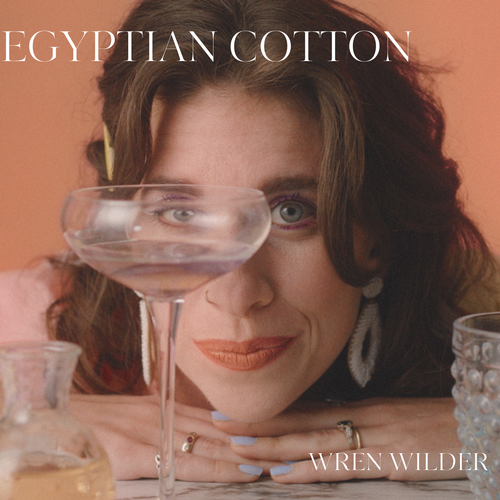“If you’re the coolest person at the table, you’re sitting at the wrong table.” That was a piece of advice Wren Wilder got from a friend of hers, and it’s a sentiment that runs through the songwriter’s lovely “Egyptian Cotton.” Egos are a fragile thing, and it can be tempting to surround yourself with a polite, non-threatening crowd in order to feel like you’re the star of the show. But that’s not how you grow as a person, and it’s certainly not how you have a good time. It’s important to brush aside the impostor syndrome and trust in yourself that you belong, that you’re an equal to the people you cherish and admire.
The song has a similar sense of encouraging warmth. Riding a jaunty Wurlitzer riff, Wilder sings a bright, happy melody, like she’s starring in a coming-of-age musical of her own imagination. (Wilder lists Regina Spektor as an influence, and you can hear the twee-but-not-overly-precious sensibility of Spektor’s best here.) The song’s sunny optimism is matched by its music video, where various split screen Wilders sing along in pastel-colored suits. “I don’t know if this story has a happy end,” she admits, before cheerfully adding “but I can play pretend!” There’s something to be said about faking it til you make it, and “Egyptian Cotton” makes the often-painful process of self-discovery seem not only doable but fun.
What’s the story behind “Egyptian Cotton?” Was it based on real life?
The story of “Egyptian Cotton” has never been about one singular event. It’s a relatable experience of trying to find your people. The image that always comes to mind for me is finding a place to sit during lunch on the first day of school. It’s an anxiety that I forgot about, but it shows up everywhere in adulthood. As we leave home, move to new cities, and find where we belong in this world, we also struggle to find companionship along the way. I don’t think that’s something that we talk about a lot. Finding a solid group of friends has always been challenging for me.
Who are your main songwriting influences?
For a long time, most of the music that inspired me was from an older generation. I got teased a lot for being stuck in a time warp, but now I think it was because I hadn’t found a modern artist that I identified with lyrically. Then there was Regina Spektor. I remember listening to her song, “Fidelity,” for the very first time. I’m sure my entire family can remember as well. I bopped around the house, singing along for days, and then immediately went out and bought all of her music. She was the first modern-day singer-songwriter with who I connected on a musical level. She taught me that songwriting came in many configurations, that being yourself was the only option, and that fusing your past and present could offer a whole new style of music that you never knew existed.
How has your upbringing affected your songwriting outlook?
I grew up like many children of the ’90s, inventing new dance moves with my best friends to Britney Spears, The Backstreet Boys, and Brandy Norwood in the lawn while the sun went down. Along with this anecdote of my deep-rooted appreciation of pop music, I have these episodic memories of how music came to me in different parts of my life. Driving around with my Egyptian grandfather in his old, black car lined with red velvet seats as he listened to Beethoven and chewed Chiclets gum. I studied the violin for 10 years and developed a love of orchestral music. Singing myself to sleep while my dad’s band rehearsed under my bedroom every night for years. I picked up the piano in order to accompany myself as a vocalist. Waking up to the smell of waffles and the sound of Billie Holiday as my mother sang along in the kitchen. It inspired me to study the art of jazz music. These experiences have shaped, not only my progression as an artist, but the signature sound that makes me Wren Wilder.
If you could describe your music in one word, what would it be?
My music is personal. Whether it’s a story from my own life or a friend’s, it features my own perspective on the situation and how to move through it.
What are your ambitions for the future?
The only thing I’m sure about is creating music that encourages people to see their problems from a different angle and to bring them the confidence to take action and risks. I want to be there for someone who feels alone, the way that I felt when I discovered Regina. And I want to have a platform to help change the way we treat the environment. There needs to be more advocacy for environmental change right now, otherwise, we won’t have a beautiful planet to fight for anymore. I’m not willing to let that happen for the sake of convenience.







